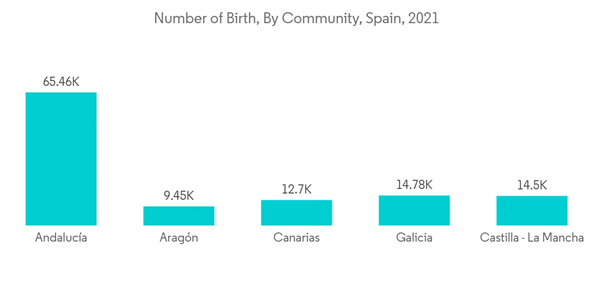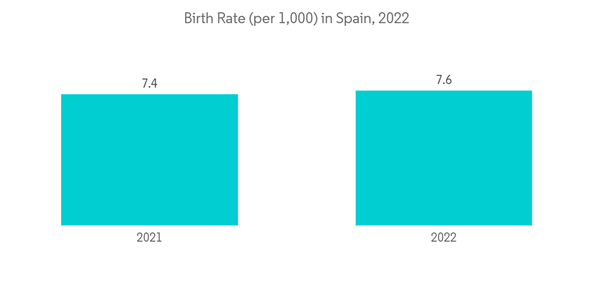The healthcare system witnessed enormous challenges as a result of the COVID-19 pandemic. All outpatient treatments were postponed or restricted during the COVID-19 pandemic to reduce the risk of viral transmission, as most chronic therapies were regarded as non-urgent. According to an article published in the International Journal of Environmental Research and Public Health in April 2022, pregnant women who were infected with COVID-19 were more likely to have a lack of labor companionship, mother-infant separation, and admission to intensive care units (ICU), as well as preterm births and NICU admissions. The difficulties associated with the infection significantly affected market growth during the COVID-19 pandemic. However, the market is currently rebounding well with the resumption of all hospital services. Hence, the demand for neonatal and prenatal care devices is expected to increase over the forecast period.
The primary factors driving the growth of this market are the rising awareness of the importance of neonatal and prenatal care, the rising incidence of preterm births, and the increased demand for prenatal therapeutics, diagnostics, and monitoring devices. An article published in the International Journal of Nursing Studies in November 2021 indicated that midwifery care in Spain was associated with lower rates of operative births and severe perineal damage and had no higher adverse outcomes. The study suggested a shift in the current maternity care system towards greater integration of midwifery-led services to achieve optimal birth outcomes for women and newborns. The increasing demand to improve neonatal services provided in the nation is expected to boost market growth over the forecast period.
Additionally, the rise in prenatal diagnoses in the nation is expected to contribute to market growth. For instance, according to an article published in the journal Ultrasound in Obstetrics & Gynecology in September 2022, there was an increase in prenatal diagnosis in Spain, owing to the introduction of novel diagnostic techniques such as microarray.
All the aforementioned factors are expected to boost market growth over the forecast period. However, the low birth rate in developed nations is a major challenge hindering the growth of the neonatal and prenatal devices market.
Spain Neonatal and Prenatal Devices Market Trends
The Ultrasound and Ultrasonography Devices Segment is Expected to Hold a Major Market Share in the Spain Neonatal and Prenatal Devices Market.
The increasing demand for ultrasound devices during pregnancy check-ups in the country is a major factor driving the market's expansion. According to the Vital Statistics (Births, Deaths, and Marriages), Basic Demographic Indicators report by the Statistical Organization in Spain published in June 2022, around 336,811 births were recorded in Spain in the year 2021. Although the numbers reported showed a decline of 1.3% compared to the previous year, the large volume of people in the nation requiring ultrasound and ultrasonography devices for their regular health check-ups is expected to add to the growth of the studied market over the forecast period.An article published by a group of Spanish researchers in Scientific Reports in April 2021 indicated that ultrasound measurement of cervical length is the most commonly used predictor of risks in pregnancy. The use of ultrasound devices for detecting preterm births in the nation is expected to propel the growth of the ultrasound and ultrasonography devices segment in the neonatal and prenatal devices market over the forecast period.
Recent product launches by key market players in the country are also helping to drive the growth of the studied market. For instance, in March 2021, GE Healthcare launched its new, hand-held ultrasound device, the Vscan Air, for sale in Spain.
The Infant Warmers and Incubators Segment is Expected to Hold a Significant Share Over The Forecast Period
An infant warmer is a vital piece of equipment in neonatal intensive care units, designed to provide the newborn with a pleasant thermal environment that keeps its body temperature between 36 and 37 degrees. A neonatal incubator is a device consisting of a hard, box-like enclosure that holds an infant in a controlled environment for medical care. It is used in combination with other equipment and procedures to ensure that babies needing extra support have the best possible environment and continuous monitoring.The research and development and technological advancements in the product are expected to boost segment growth over the forecast period. For instance, in July 2022, ten incubators built by students and teachers from Salesian Vocational Training Centers in Spain were sent to the Navarre-based "Cluster SOS Ukraine" platform to be donated to Ukrainian hospitals. Currently, four of these customized cribs have been deployed in hospitals in Kyiv and Mykolaiv. Ukrainian doctors are already using these devices, and they particularly value the ability to use phototherapy.
Spain Neonatal and Prenatal Devices Industry Overview
The market studied is consolidated with the presence of various small and large market players. Some of the market players are GE Healthcare, Getinge AB, Masimo, Medtronic PLC, Natus Medical Incorporated, Phoenix Medical Systems (P) Ltd, and Vyaire Medical.Additional Benefits:
- The market estimate (ME) sheet in Excel format
- 3 months of analyst support
This product will be delivered within 2 business days.
Table of Contents
Companies Mentioned (Partial List)
A selection of companies mentioned in this report includes, but is not limited to:
- GE Healthcare
- Getinge AB
- Masimo
- Medtronic PLC
- Natus Medical Incorporated
- Phoenix Medical Systems (P) Ltd
- Vyaire Medical
- Cardinal Health










